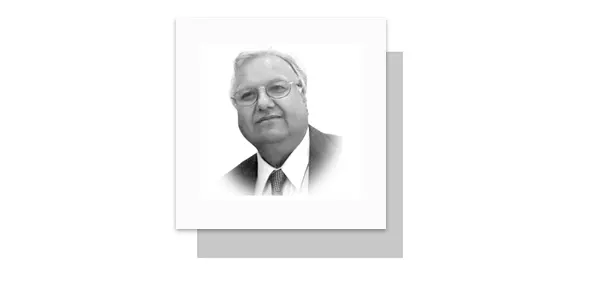THE fire that was ignited around us forty or fifty years ago has now reached Darul Uloom Haqqania, and Maulana Hamid-ul-Haq Haqqani, drenched in blood, is standing there asking, “For what crime was I murdered?” Who will answer this oppressed man’s question? The fear is that no one will.
Just as Maulana Sami-ul-Haq was forgotten, this tragedy in Akora Khattak will also be consigned to oblivion.
The late Rafiq Afghan comes to mind.
In one sitting, he said that the Afghan Jihad was not just a political event but also a civilizational phenomenon from which the “Jihadi culture” was born.
This culture has now become an integral part of our society.
It was an era of intense emotions. People believed that if not today, then tomorrow, Afghanistan would become the cradle of revolution, whose blessed effects would be felt not only in Pakistan but across the entire region. This mindset introduced many foreign names into our conversations. It was not just Osama bin Laden and Ayman al-Zawahiri; there were many others who left their comfortable homes to come here or take refuge in the mountains. Many formed familial ties here and became part of the land. The migration from their homelands and the establishment of relationships with these migrants were driven by the same spirit that Rafiq Afghan once described as the “Jihadi culture.” People were deceived by Iqbal’s dream from this culture, which had proclaimed:
“The man of dust is the neighbor of the Archangel Jibreel, His abode is neither Bukhara nor Badakhshan.” This situation was somewhat similar to the atmosphere during the Khilafat Movement before independence. At that time, four of our elders advised the nation to stay away from this emotional wave—among them were Allama Iqbal, Quaid-e-Azam, Maulana Ashraf Ali Thanvi and Syed Abul A’la Maududi. In the last decades of the twentieth century, when a similar emotional climate arose, three of these elders were no longer present, but Maulana Maududi was still alive. However, a segment of his followers was eager to actively participate in the Afghan Jihad. The biggest question before the student wing of the Islamic movement at that time was: “Should the workers of Islami Jamiat-e-Talaba be allowed to go to Afghanistan and fight alongside the Mujahideen?”
This question created two viewpoints within Islami Jamiat-e-Talaba. One group was ready for Jihad, while the other believed that Jihad was justified, but participating in it was not as simple a decision for Pakistanis as it was for Afghans. Thus, the organization’s central executive sought guidance from Maulana Maududi. Details of this historic meeting have been recorded by Professor Saleem Mansoor Khalid in his book “Tasreehat”. Maulana Maududi stated that, as Afghanistan’s neighbor, Pakistan’s role in Jihad should be to help the war victims in every possible way, but taking up arms and crossing borders for armed activities on foreign soil was not permissible.
Maulana Jan Muhammad Abbasi, one of Maulana Maududi’s long-time companions, remained steadfast in his ideology. I had several discussions with him on the Afghan Jihad. He used to say that a young man who picks up a weapon and goes to Afghanistan will never return with the same mindset. He believed that such activities would instill violent tendencies in our youth, disrupting the processes of preaching, education and intellectual development—which would be a great tragedy. This was in the early 1990s when a bomb exploded in a cinema in Lahore. The perpetrators of this terrorist attack were a few young men who had returned from Afghanistan. In their view, such “immoral activities” had no place in an Islamic society.
Our youth did not return from Afghanistan with just a militant mindset; they also absorbed extremist ideologies that equated dissent with disbelief. They considered political participation un-Islamic—even Pakistan’s constitution fell into this category in their eyes. To them, disagreement was tantamount to blasphemy, punishable only by death. Over the past thirty years, Pakistan has witnessed immense bloodshed—not just in mosques and Imambargahs but even at the shrines of saints. This wave of violence, which has drained our strength over the decades, is the result of the same extremist mindset. Maulana Hamid-ul-Haq, too, became a victim of this madness. His only “crime” was that he raised his voice for women’s education and sought to protect religious circles from the extremism that has not only disrupted societal peace but also tarnished the face of Islam itself.
Now that Maulana Hamid-ul-Haq is gone, we must learn from this tragedy. What can be done to stop this storm of oppression in our land? This is not an impossible question. It was in response to this threat that our state and religious scholars, a few years ago, issued the Paigham-e-Pakistan fatwa, declaring it un-Islamic to take up arms and kill anyone within the state. This historic document was the result of dedicated efforts by scholars, including Dr. Zia-ul-Haq of the Islamic Research Institute. The fatwa was widely appreciated worldwide, with several Islamic countries adopting it verbatim.
While this fatwa was an important step against extremism and bloodshed, violence has persisted despite it. This indicates that while our visionary scholars fulfilled their duty by drafting the document, it has failed to influence those still holding weapons. One could argue that foreign powers are behind this extremism, and that may be true. But the fact remains that their recruits are found among us. It is now imperative for our serious religious circles to reach out to these individuals—and, if possible, even extend their influence to Afghanistan—to convince armed groups there to abandon violence. Similarly, the extremist elements settled in Pakistan during the PTI government must be made to understand that their weapons are bringing no benefit to Islam—only destruction. And destruction always strikes back. This painful incident at Darul Uloom Haqqania carries this lesson as well.
—This writer is former advisor to the President of Pakistan, author & mass media theorist.
(farooq.adilbhuta@gmail,com)









